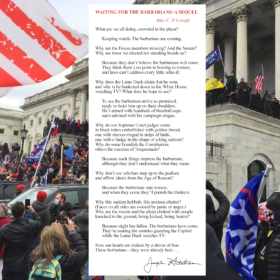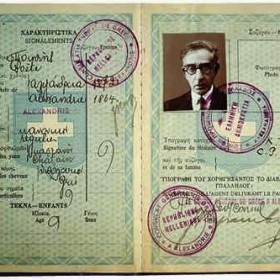-

Waiting for the Barbarians: A Sequel
This poem is an updated and repurposed version of “Waiting for the Barbarians,” by C. P. Cavafy, translated by Edmund Keeley. Read it here.Read More
-

Cavafy at 150
A spread from Constantine Cavafy’s last passport, listing “Poet” as occupationand two discrete birth dates, both erroneous.www.cavafy.com “What is it, I wonder, about our increasingly cosmopolitan, multi-cultural and multilingual cities, whether New York or Athens, that needs a poet like Cavafy? What are the best ways to learn and go on learning from his poetry? How can we reconcile public legacies with the privateness of literature?” I won’t say that scholar and translator Karen Van Dyck fully answers these questions in “Forms of Cosmopolitanism,” but her ponderings are fascinating to say the least.Read More
-

Marginalia on My Birthday
Roman mosaic of the Greek poet Alkman(2nd Century BCE) After Davenport’s Alkman* June 26, 2013 Nostalgia for the ancientdays which had I lived thenI with my childhood illnesseswould not have lived to see ______________________________* 7 Greeks: Translations by Guy DavenportRead More
-

Out and Back to Ithaka
Startling and yet imaginatively right to see images of the Southwest here. Are those Anasazi cliff dwellings at Mesa Verde or Canyon de Chelly? Powerful images in any case. And the resonant voice of Sean Connery leading us from one to another, borne along by the current of Vangelis’s music. Lovely! The translation is uncredited on YouTube but is by Edmund Keeley and Philip Sherrard. It’s available in The Essential Cavafy and at various locations online, including the amazing C. P. Cavafy site.Read More
-

Adios, Daryl Hine
It’s sad to lose Daryl Hine, even though I never became a fan of his poetry, because his translations are wonderful. I especially appreciate his versions of The Homeric Hymns. The originals come a period between 600 BCE to 400 CE—a thousand years during which Homer’s epic diction was turned to more personal uses.Read More
-

Graveside in Damascus
In the recently released A Levant Journal, translated by Roderick Beaton from the Greek of Nobel Prize winning poet George Seferis, the great poet visits the grave of Jane Digby (a.k.a. “Ianthe”) in Damascus. As so often in his journals, Seferis produces what amounts to a prose poem—a brief description full of suggestive disturbances. He is incapable, it seems, of shallow writing. It was getting dark, a wind was blowing. Between the grave and the surrounding wall was a great walnut tree heavy with ripening fruit.Read More
-

Lvov to Telos to Me to You
A new collection by the great Polish poet Adam Zagajewski, entitled Eternal Enemies, has just appeared from Farrar, Straus and Giroux—and it will knock your socks off.Read More
-

Robert Fagles’ Last Translation
“Robert Fagles, the renowned translator of Latin and Greek whose versions of Homer and Virgil were unlikely best sellers and became fixtures on classroom reading lists, died on Wednesday at his home in Princeton, N.J., where he was an emeritus professor at Princeton University.Read More


 Joseph Hutchison, Colorado Poet Laureate 2014-2019, has published 20 collections of poems and edited or co-edited three poetry anthologies. He currently directs two master’s-level programs for University College at the University of Denver: Professional Creative Writing and Arts & Culture Management. Joe lives with his wife, Melody Madonna, in the mountains southwest of Denver, Colorado, the city where he was born.
Joseph Hutchison, Colorado Poet Laureate 2014-2019, has published 20 collections of poems and edited or co-edited three poetry anthologies. He currently directs two master’s-level programs for University College at the University of Denver: Professional Creative Writing and Arts & Culture Management. Joe lives with his wife, Melody Madonna, in the mountains southwest of Denver, Colorado, the city where he was born. 









